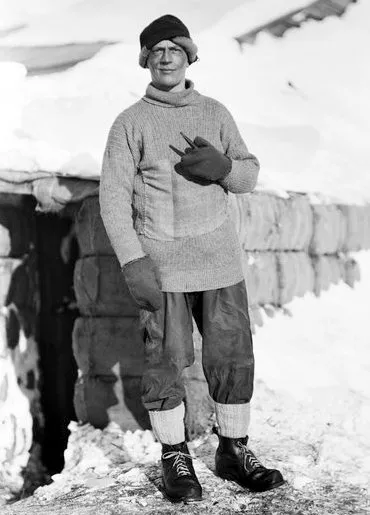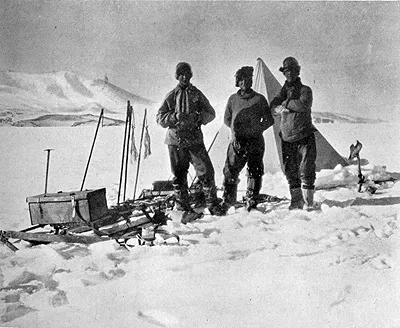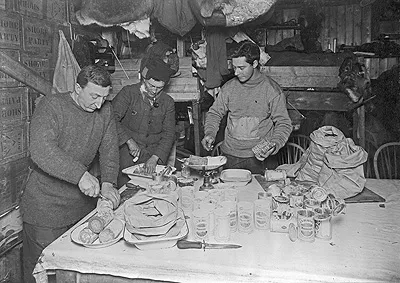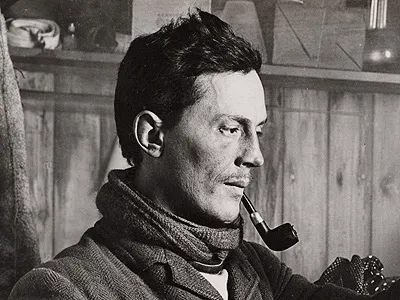Edward Leicester Atkinson R.N.
1881 - 1929, Biographical
notes
Surgeon, parasitologist - Terra Nova 1910-13
 Edward
Atkinson - Atch
Edward
Atkinson - Atch
23rd November 1881 - 20th February
1929
Born in Saint Vincent in the Windward Islands in the Caribbean in 1881 and educated in London, Atkinson was light heavyweight boxing champion at St. Thomas's hospital during his medical training, he qualified as a doctor in 1906 and joined the Royal Navy in 1908.
He joined Scott on the Terra Nova expedition as a parasitologist and chief medical officer, most of his time being taken up by the former, then as today there is usually little call for the medical skills of a doctor on an expedition, they are there to account for the unforeseen..
He was involved with depot laying in January-March 1911 as preparation for the south pole attempt later in the year. Starting in November 1911 he accompanied Scott's Polar Party by leading a pony pulling a sledge as far as the upper Beardmore Glacier depot before returning to the expedition base. He was left in command of the Terra Nova Expedition's Cape Evans base as the remaining officer for most of 1912 after Scott and his party died on the way back from the Pole and with Campbell's Northern Party forced to over winter after being unable to return to base. The winter was difficult with two expedition parties having not returned and the Pole Party almost certainly all dead, though without definitive confirmation.
On the 29th of October 1912 Atkinson led a search party which found the tent with the bodies of Scott, Bowers and Wilson along with Scott's diary which detailed the disaster that had befallen them. They searched for Oates's body with no success though did find his sleeping bag and returned to the base hut on the 25th of November.
Following the expedition, he worked in China where he discovered the cause of the parasitic disease schistosomiasis (or bilharzia). He returned to England at the outbreak of the First World War when he enlisted and served with distinction being decorated twice and wounded several times, he served at Gallipoli, at the Somme and supported the White Army after the Russian Revolution. Following the war, he remained in the navy reaching the rank of Surgeon Captain, he retired in 1928 on health grounds following the death of his wife and died suddenly at sea in the Mediterranean in 1929 at the age of 47, he was buried at sea.
References to Edward Atkinson by Cherry-Garrard in "The Worst Journey in the World"
-
Oates and Atkinson generally worked together in a solid, dependable and somewhat humorous way.
-
But Atkinson on Scurvy had an audience each member of which felt that he had a personal interest in the subject under discussion. Indeed one of his hearers was to suffer the advanced stage of this dread disease within six months. Atkinson inclined to Almroth Wright's theory that scurvy is due to an acid intoxication of the blood caused by bacteria.
-
Darkness, cold, and hard work are in Atkinson's opinion important causes of scurvy.
-
Atkinson's continued absence was not noticed at the hut until dinner was nearly over at 7.15; that is, until he had been absent about two hours. The wind at Cape Evans had dropped though it was thick all round, and no great anxiety was felt: some went out and shouted, others went north with a lantern, and Day arranged to light a paraffin flare on Wind Vane Hill. Atkinson never experienced this lull, and having seen the way blizzards will sweep down the Strait though the coastline is comparatively clear and calm, I can understand how he was in the thick of it all the time. I feel convinced that most of these blizzards are local affairs. The party which had gone north returned at 9.30 without news, and Scott became seriously alarmed. Between 9.30 and 10 six search parties started out. But time was passing and Atkinson had been away more than six hours.
The light which Atkinson had seen was a flare of tow soaked in petrol lit by Day at Cape Evans. He corrected his course and before long was under the rock upon which Day could be seen working like some lanky devil in one of Dante's hells. Atkinson shouted again and again but could not attract his attention, and finally walked almost into the hut before he was found by two men searching the Cape. "It was all my own damned fault," he said, "but Scott never slanged me at all." I really think we should all have been as merciful! Wouldn't you?
And that was that: but he had a beastly hand. -
During this journey Forde got his hand badly frost-bitten which necessitated his return in the Terra Nova in March 1912. He owed a good deal to the skilful treatment Atkinson gave it.
-
On the 31st October the pony parties started. Two weak ponies led by Atkinson and Keohane were sent off first at 4.30, and I accompanied them for about a mile.
-
But poor Jehu was in a bad way, stopping every few hundred yards. It was a funereal business for the leaders of these crock ponies; and at this stage of the journey Atkinson, Wright and Keohane had many more difficulties than most of us, and the success of their ponies was largely due to their patience and care.
-
The day really lives in my memory because of the troubles of Keohane. He fell into crevasses to the full length of his harness eight times in twenty-five minutes. Little wonder he looked a bit dazed. And Atkinson went down into one chasm head foremost: the worst crevasse fall I've ever seen. But luckily the shoulder straps of his harness stood the strain and we pulled him up little the worse.
-
Atkinson would soon have to start on his travels again. Before we left Scott at the top of the Beardmore he gave him orders to take the two dog-teams South in the event of Meares having to return home, as seemed likely. This was not meant in any way to be a relief journey. Scott said that he was not relying upon the dogs; and that in view of the sledging in the following year, the dogs were not to be risked.
-
Thus it was that when Atkinson came to make his plans to go South with the dogs he found that there was no dog-food south of Corner Camp, and that the rations for the return of the Polar Party from One Ton Depot had still to be taken out. That is to say, the depot of dog-food spoken of by Scott did not exist. There was, however, enough food already at One Ton to allow the Polar Party to come in on reduced rations. This meant that what the dog-teams could do was limited, and was much less than it might have been had it been possible to take out the depot of dog-food to One Ton.
-
The blizzard raged all that day, and the next night and morning, and nothing could be done. But during the afternoon of the 20th the conditions improved, and at 4.30 p.m. Atkinson and Dimitri started with the two dog-teams, though it was still blowing hard and very thick. They travelled, with one rest for the dogs, until 4.30 p.m. the next day, but had a very hazy idea where they were most of the time, owing to the vile weather: once at any rate they seem to have got right in under White Island. When they camped the second time they thought they were in the neighbourhood of Lashly's tent, and in a temporary clearance they saw the flag which Lashly had put up on the sledge. Evans was still alive, and Atkinson was able to give him immediately the fresh vegetables, fruit, and seal meat which his body wanted. Atkinson has never been able to express adequately the admiration he feels for Lashly's care and nursing.
-
Atkinson was the senior officer left, and unless Campbell and his party came in, the command of the Main Party devolved upon him. It was not a position which any one could envy even if he had been fresh and fit. Amidst all his anxieties and responsibilities he looked after me with the greatest patience and care. I was so weak that sometimes I could only keep on my legs with difficulty: the glands of my throat were swollen so that I could hardly speak or swallow: my heart was strained and I had considerable pain. At such a time I was only a nuisance, but nothing could have exceeded his kindness and his skill with the few drugs which we possessed.
-
Some difficulty was experienced the next morning in climbing the ice-cliff on to the Peninsula, but Atkinson, using his knife as a purchase, and the sledge held at arm's-length by four men as a ladder, succeeded eventually in getting a foothold.
-
As we neared the Cape Atkinson turned to me: "Would you go for Campbell or the Polar Party next year?" he said. "Campbell," I answered: just then it seemed to me unthinkable that we should leave live men to search for those who were dead.
-
Atkinson was in command: in addition, he and Dimitri took over the care of the dogs. Many of these, both those which had been out sledging and those just arrived, were in a very poor state, and a dog hospital was soon built. At this date we had 24 dogs left from the last year, and 11 dogs brought down recently by the ship: three of the new dogs had already died.
-
Atkinson gathered every one together and read to them the account of Oates' death given in Scott's Diary: Scott expressly states that he wished it known. His (Scott's) last words are:
"For God's sake take care of our people."
Then Atkinson read the lesson from the Burial Service from Corinthians. Perhaps it has never been read in a more magnificent cathedral and under more impressive circumstances - for it is a grave which kings must envy. Then some prayers from the Burial Service: and there with the floor-cloth under them and the tent above we buried them in their sleeping-bags - and surely their work has not been in vain. -
Hour after hour, so it seemed to me, Atkinson sat in our tent and read. The finder was to read the diary and then it was to be brought home - these were Scott's instructions written on the cover. But Atkinson said he was only going to read sufficient to know what had happened - and after that they were brought home unopened and unread.
-
Atkinson has been quite splendid in this very trying time.
-
His voice has been with me often since those days - that gruffish deep affectionate monosyllabic way he used to talk to you...he could not help the tenderness poking through. I am glad to have this opportunity to witness something of what we owe him.
References to Edward Atkinson by Scott in "Scott's Last Expedition"
-
We tried Atkinson's blubber stove this afternoon with great success. The interior of the stove holds a pipe in a single coil pierced with holes on the under side. These holes drip oil on to an asbestos burner. The blubber is placed in a tank suitably built around the chimney; the overflow of oil from this tank leads to the feed pipe in the stove, with a cock to regulate the flow. A very simple device, but as has been shown a very effective one; the stove gives great heat, but, of course, some blubber smell. However, with such stoves in the south one would never lack cooked food or warm hut.
-
We have all been away on ski on the large floe to which we anchored this morning. Gran is wonderfully good and gives instruction well. It was hot and garments came off one by one--the Soldier and Atkinson were stripped to the waist eventually, and have been sliding round the floe for some time in that condition.
-
Atkinson has discovered a new tapeworm in the intestines of the Adelie penguin--a very tiny worm one-eighth of an inch in length with a propeller-shaped head.
-
Atkinson is very bad with snow blindness to-night; also Bruce. Others have a touch of the same disease. It's well for people to get experience of the necessity of safeguarding their eyes.
-
We had an excellent game of football again to-day--the exercise is delightful and we get very warm. Atkinson is by far the best player, but Hooper, P.O. Evans, and Crean are also quite good.
-
Adjacent to the physicist's corner of the hut Atkinson is quietly pursuing the subject of parasites. Already he is in a new world. The laying out of the fish trap was his action and the catches are his field of labour. Constantly he comes to ask if I would like to see some new form and I am taken to see some protozoa or ascidian isolated on the slide plate of his microscope. The fishes themselves are comparatively new to science; it is strange that their parasites should have been under investigation so soon.
-
Atkinson is making a new fish trap hole; from one cause and another, the breaking of the trap, and the freezing of the hole, no catch has been made for some time. I don't think we shall get good catches during the dark season, but Atkinson's own requirements are small, and the fish, though nice enough, are not such a luxury as to be greatly missed from our 'menu.'
-
In fact Atkinson has really no very clear idea of what happened to him after he missed the Cape. He seems to have wandered aimlessly up wind till he hit an island; he walked all round this; says he couldn't see a yard at this time; fell often into the tide crack; finally stopped under the lee of some rocks; here got his hand frostbitten owing to difficulty of getting frozen mit on again, finally got it on; started to dig a hole to wait in. Saw something of the moon and left the island; lost the moon and wanted to go back; could find nothing; finally stumbled on another island, perhaps the same one; waited again, again saw the moon, now clearing; shaped some sort of course by it--then saw flare on Cape and came on rapidly--says he shouted to someone on Cape quite close to him, greatly surprised not to get an answer. It is a rambling tale to-night and a half thawed brain. It is impossible to listen to such a tale without appreciating that it has been a close escape or that there would have been no escape had the blizzard continued.
-
Atkinson is suffering a good deal from his hand: the frostbite was deeper than I thought; fortunately he can now feel all his fingers, though it was twenty-four hours before sensation returned to one of them.
Landmarks named after Edward Atkinson
Feature Name: Atkinson Cliffs
Type: Cliff
Latitude: 71° 18'00S
Longitude: 168° 55'00E
Description: High coastal cliffs, 4 mi long, between the lower ends of Fendley Glacier and Pitkevitch Glacier on the N coast of Victoria Land. The feature was mapped in 1911 by the Northern Party of the British Antarctic Expedition (BrAE), 1910-13, and named for Dr. Edward L. Atkinson, surgeon of the expedition.
Other Crew of the Terra Nova Expedition
Abbot,
George Percy - Petty Officer, R.N. - 1, 2, N
Atkinson, Edward
L. - R.N. - surgeon, parasitologist - 1, 2, D, P, S
Balson,
Albert - Leading seaman, R.N.- 1, 2
Bowers,
Henry Robertson - Lieutenant - 1, 2, D, C,
Po
Browning,
Frank Vernon - Petty Officer - 1, 2, N
Campbell,
Victor - Lieutenant, R.N. - 1, 2, N
Cheetham,
Alfred B. - Boatswain (Bosun), R.N.R.
Cherry-Garrard,
Apsley - Assistant zoologist - 1, 2, D, C, S
Crean,
Tom - petty officer, R.N. - 1, 2, D, P, S
Debenham, Frank
- Geologist - 1, 2, iW, iiW
Dickason,
Harry - Able Seaman - 1, 2, N
Evans, Edgar - petty
officer, R.N. - 1, iW, Po
Evans, Edward R.G.R. - Lieutenant, R.N. "Teddy Evans" -
second in command, and Captain of the Terra Nova - 1, D, P
Girev
(Geroff), Dmitriy - Dog driver - 1, 2, D, P, S
Gran,
Tryggve - ski expert - 1, 2, D, iiW, S
Lashly, William
- chief stoker, R.N. - 1, 2, P, S
Levick,
G. Murray - Surgeon, R.N. - 1, 2, N
Lillie, Dennis Gascoigne - Biologist
on the ship
McLeod, Thomas
F. - Able seaman - 1, 2
Meares, Cecil
H. - in charge of dogs - 1, D, P
Oates, Lawrence
- Capt. 6th Iniskilling Dragoons - 1, D,
Po
Ponting,
Herbert G. - Camera artist - 1
Priestley,
Raymond E. - Geologist - 1, 2, N
Omelchenko,
Anton - Groom - 1
Scott, Robert
Falcon - Commander, R.N. -
Expedition leader - 1, D, Po
Simpson,
George - Meteorologist - 1
Taylor,
T. Griffith - Geologist - 1, iW, iiW
Wilson,
Edward Adrian - chief of scientific staff and biologist - 1, D, C,
Po
Wright,
Charles Seymour - Physicist - 1, 2, iW, P, S
Key:
1 - first winter
2 - second winter
iW - first western party
iiW - second western party
N - northern
party
D - depot laying for south pole journey
P - south pole party
C - winter journey to Cape Crozier
S - search party for south Pole
party
Po - reached
South Pole
Biographical information
- I am concentrating on the Polar experiences of the men involved.
Any further information or pictures visitors may have will be gratefully received.
Please email
- Paul Ward, webmaster.
What are the chances that my ancestor was an unsung part of the Heroic Age
of Antarctic Exploration?



